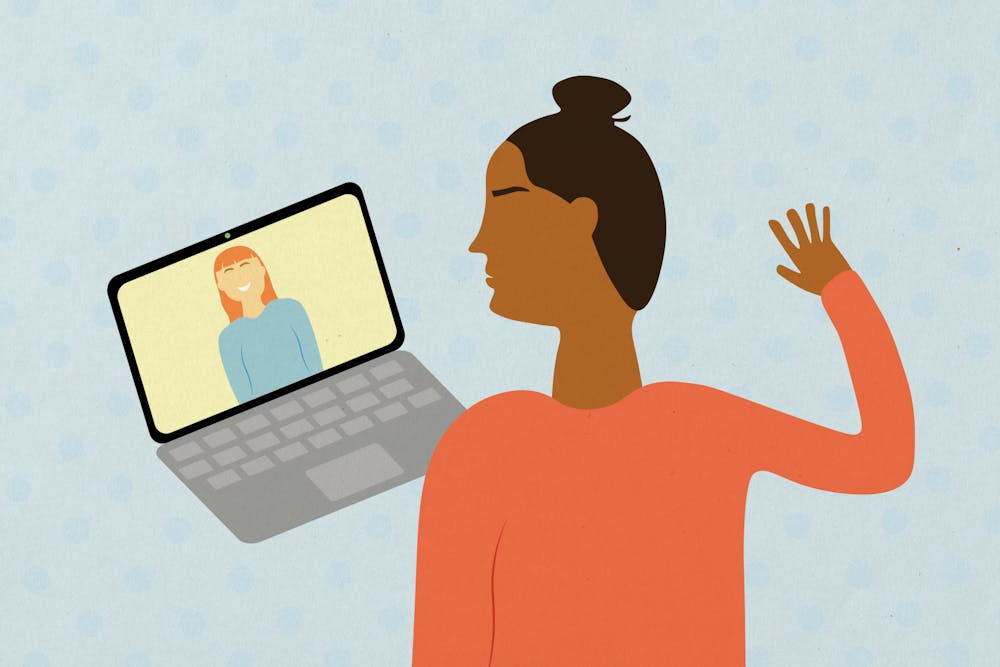
New Student Orientation is traditionally a week of making memories, attending parties, and cashing in on free food, headlined by the annual toga party at the Penn Museum. But amid the coronavirus pandemic, the Class of 2024 experienced an all-virtual NSO last week.
First years praised the overall NSO experience despite its completely remote status, hailing the week as a great opportunity to meet other first years through an avenue other than social media. Some students, however, encountered difficulties accessing certain events online and wished events allowed for more communication amongst students.
NSO activities, which began on Aug. 24 and ended with the online Opening Convocation Ceremony on Aug. 31, featured various online events such as preceptorials — lectures and seminars hosted by student groups and faculty members — school and department specific information sessions, and games like the Penn Traditions Prize Pursuit Quizzo.
All first years were required to attend the Penn Violence Prevention Circles, small group Zoom discussions centered around building relationships and normalizing conversations about intimate partner violence. The discussions were facilitated by Penn Anti Violence Educators, who are current Penn students trained to facilitate workshops and trainings about bystanders' roles in ending sexual and relationship violence on campus.
College and Wharton first year Luis Renato Gonzalez said he appreciated the opportunity to participate in a more intimate discussion setting with his peers through the PVP circles. He added that the PAVE discussion facilitators created a safe space for students to talk about relationships and abuse.
Wharton first year Maura Pinder agreed, adding that she particularly enjoyed the PVP circles, as it was her first interaction with Penn students that was not over social media.
“It was just so nice to be in a community of people who were all really well-spoken and all had really informative things to say," she said.
Some students pointed to the advantage of conducting NSO online, citing the large variety and number of events they could attend by simply re-navigating their browser.
“One of the upsides of having [NSO] remotely is that you could choose from so many different options and really choose an NSO experience that fits your interests,” College first year Leann Luong said. “That might not have been able to happen in person.”
Luong said that getting to know people over a video call was fairly easy considering most incoming first years grew up in a world of technology.
“As a part of such a digital generation, we are used to talking on FaceTime, and Zoom calls are so similar to that,” she said. “We can find another person on Instagram or Snapchat so fast, so that made it very easy to form connections even after just meeting someone on a Zoom call.”
Other students, however, felt it was more difficult to connect with students in a completely virtual format.
Wharton first year Shan Shan Liang said she does not feel as if the social interactions between her and other students during NSO were genuine given the virtual nature of the experience.
“I did have a good opportunity to meet people, but I don’t think that the people I met during NSO were genuine connections,” she said. “You can’t really be good friends with people after just meeting them once or twice over Zoom.”
Liang added that she wished the preceptorials were more seminar-based instead of lecture style to encourage more discussion among students. She said conversations could have flowed better if the breakout rooms on Zoom calls were smaller, as those with more than six people were typically silent with people's microphones turned off to avoid interrupting someone else.
Wharton first year Katherine Hu said she had trouble accessing certain preceptorials, as they were not held on a uniform platform. Some used BlueJeans or Youtube while others used Zoom, she said. She added that links for preceptorials would sometimes not work, while others would be canceled without notice.
Despite the heavy lecture component of preceptorials, Liang said the preceptorials were her favorite part of NSO. She said she particularly enjoyed Penn Community for Justice's preceptorial, “The ‘Civic Ivy’ in the Wake of BLM," on Penn's history of refusing to pay PILOTS in West Philadelphia. Penn Community for Justice is an organization made up of Penn students, faculty, and staff demanding economic and racial justice within the Penn community.
Other events first-year students could attend included parent webinars, which Pinder said helped put her parents at ease about entering college during the COVID-19 pandemic, and the Penn Traditions Prize Pursuit Quizzo, a Penn trivia competition between teams of students held over a Zoom call with over 370 attendees, Hu said.
“I think a lot of [the events] were geared towards academic interests or career interests, but I feel like the Quizzo was a time everyone could just relax and be themselves,” Hu said. “It was a really great way to get to know people and to relieve our stress and anxieties before the semester started.”
Luong also attended the Quizzo and said she enjoyed Penn students' competitive spirit. She said the prizes created an incentive for students to talk to each other in breakout rooms and collaborate, which allowed them to get to know each other better.
“Whether it’s in person or remote, the conversations you have remain the same,” Luong said. “In essence, I feel like it’s still the exact same NSO experience.”
The Daily Pennsylvanian is an independent, student-run newspaper. Please consider making a donation to support the coverage that shapes the University. Your generosity ensures a future of strong journalism at Penn.
Donate







